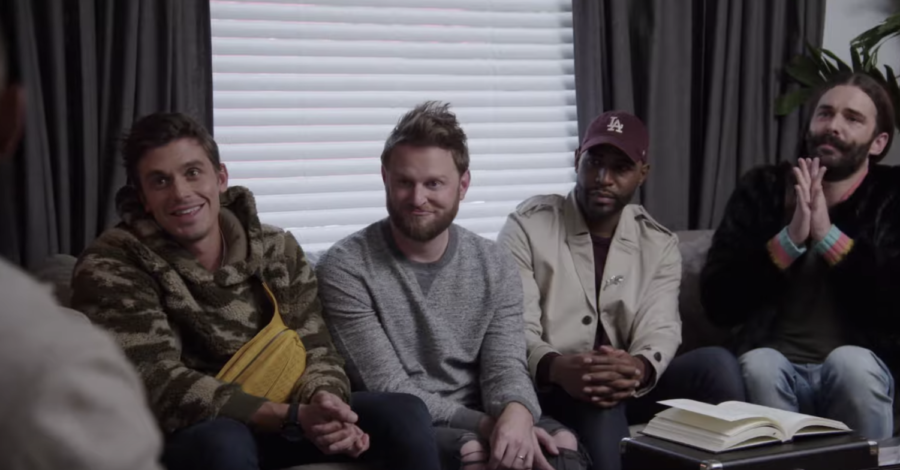- Limelight
- Limelight / Culture
- Limelight / Culture / Pop Culture
- Limelight / Reviews
- Limelight / Visual Media
- Limelight / Visual Media / Tv
The Fab Five open up in “Queer Eye” season four
July 25, 2019
The fourth season of Netflix’s hit show “Queer Eye” sees the Fab Five taking on a more human aspect, rather than the larger-than-life personas they have cultivated over their previous three seasons.
Season four, which starts out in grooming specialist Jonathan Van Ness’ hometown of Quincy, Ill., features members of the Fab Five taking on projects in Illinois and in the Kansas City, Mo. area. The season also marks the first time the group has had a physically disabled person as one of their subjects.
This season, the fourth since the show’s premiere in February 2018, focuses just as much on the lives, trials and anxieties of its five core members as it does the subjects they are sent to help. This is seen right off the bat in the first episode, where Van Ness meets up with a music teacher who had a significant impact on his life growing up. Van Ness becomes emotional multiple times and admits to her how much it meant for her to treat him like every other kid.
The trend continues in the second episode, which focuses on Wesley, a single dad who became paralyzed from the waist down following a shooting seven years ago. Fashion guru, Tan France, shares an especially emotional moment with Wesley after they begin talking about being comfortable with oneself. France admits that his family hadn’t known about his sexuality until after the Queer Eye premiere, creating yet another touching moment.
The episode also stands as one of culture expert Karamo Brown’s most compelling showings. Brown senses that Wesley still has issues with why he was shot multiple times and has not had the closure he needs in order to start a new chapter. In a move not possible in the early stages of the show, Brown takes Wesley to meet the man who shot him, and the conversation provides clarity for Wesley. The moment solidifies Brown’s role in the Fab Five and leaves a lasting impression on Wesley.
The show does find itself a little too caught up in inspirational clichés and it adds a bit of a disingenuine feel to some of the episodes. While the first three seasons felt truly organic, episodes in season four feel much more choreographed and fake. This is especially true in Wesley’s episode, where there is almost no let-up in emotional stories and long-winded tales of triumph.
Food expert Antoni Porowski also shares more of his personal life in “Queer Eye’s” new season. The often-criticized member of the Fab Five has not had the easiest ride during his time on the show, drawing criticism for his style of cooking that is heavy on certain ingredients. Porowski has hinted at addiction issues in earlier seasons and admitted this season that his home life wasn’t spectacular. His father, similar to episode five’s protagonist, Kenny, had trouble with hoarding and his mother had trouble showing affection, similar to episode four’s Wanda.
Season four also answers the prayers of “Queer Eye” fans in the form of giving design expert Bobby Berk more screen time. It had been a recurring joke during the previous seasons to make memes regarding how little screen time Berk received, despite having seemingly the toughest task each episode. Season four’s episodes make sure to show at least a glimpse of what Berk does behind the scenes, from creating sketches to picking interior design pieces.
Berk elaborates on his upbringing in the final episode, where he is shown feeling right at home, literally. The episode follows Matt, a single farmer who has been down on his luck since his divorce. “Farm to Able,” as the episode is titled, takes place on a rural Missouri farm, similar to the one Berk grew up on. Transforming Matt’s barn into a welcoming dining space, Berk talks about how it made him think about his childhood.
Season four of “Queer Eye” sees the show trying to take on more diverse subjects for each episode. The diversity works well for each episode but also allows for certain stereotypes and stigmas to remain, with the Fab Five taking the same approach to very different scenarios. The show has a simple, emotionally-driven formula and in season four, it works once again.







